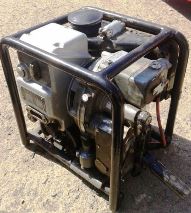
The German trophy generator used with the radio stations in 1941-45 гг.
|
But I understood that the situation required an immediate solution.
I knew the Germans used low-noise portable engines for their radio stations, which were much lighter and much simpler in maintenance than our own radio station engines.
The next day, I instructed soldiers in my company to closely follow our front line troops, and then rush into captured enemy bunkers and look for German radio stations engines.
In 1944, the Germans already "learned" how to retreat, leaving behind their military and other equipment. After about two weeks my solders brought me a captured radio station engine.
It worked silently and weighed less than one-half of a Soviet-made generator. It was such pleasure to finally own it!
Of course, I immediately threw out our old equipment; that trophy engine did not leave my side until the end of the war.
However, the story with trophy generator does not end here.
|
After World War II ended, in the summer of 1945, our division was sent to one of the Central Asian Soviet Republics - Tajikistan.
My company was stationed in the capital of Tajikistan, the city of Stalinabad (nowadays - Dushanbe; the name means “Monday” in Tajik).
Within months of our arrival, a full inventory of our military equipment was ordered. It was suddenly discovered that the regularly-issued Soviet generator for the RCB radio station (the generator I had discarded, as useless, in 1944) was still on the balance sheet and therefore missing!
I tried to reason with the authorities that so much time passed, and that a world war had taken place, and after all, the lighter and more efficient trophy German engine was available as a replacement.
But, all my explanations were absolutely in vain.
My commander gave me an oral reprimand and I was compelled to pay for the lost equipment!
And the sum was significant – one- half of the average monthly factory worker wages.
|